Food & Beverage Processing
Sign up to be notified of our new blog posts.

Chocolate and Confection Manufacturers – Remember the Valve
In the first six months of the pandemic, sales of candy increased 3.8% and chocolate grew 5.5%, with premium chocolate up 12.5%. It is this kind of robust performance that is leading many chocolate and candy producers to expand production and optimize efficiency in their operation. As they do, one area that shouldn’t be overlooked is the performance of their in-line and flush-mounted ball valves.

Soup’s On: What to Consider When Adding Capacity for Soup Production
With a nod to a famous advertising tagline, more and more people around the world are agreeing that “soup is good food”. Even without the spike in demand caused by the pandemic in 2020, the global soup market was on a steady rise. So, it’s no surprise that researchers expect significant growth in the coming years, with global annual value reaching $20B by 2026 – a nearly 20% increase over 2020. This positive outlook – driven by a growing demand for healthy convenience food, mounting interest in global and ethnic culinary offerings and heightened popularity of fresh prepared/ready-to-eat and frozen foods – is leading many soup producers to evaluate their processing operations, to make sure they can consistently churn out enough product to meet demand.

Jams, Jellies and Preserves: How to Choose the Right Processing Vessel
As consumers focus on healthy lifestyles and opt for natural products, demand for jam, jelly, and preserve products is growing. This growth, and the arrival of products featuring less sugar and the use of a wider range of spices, herbs and rare or exotic fruits, is leading some manufacturers to consider modifying, upgrading or adding processing equipment to keep pace. Ultimately, their equipment choices can have a significant effect on their overall operational performance. Learn more in our latest blog article:

Equipment Considerations for Plant-Based Food Processing
The plant-based food market is expected to expand at a compound annual growth rate (CAGR) of 11.9% from 2020 to 2027, and will reach $74.2 billion by 2027. As food manufacturers look to ramp up production of plant-based products, they must determine how to configure their processing equipment to effectively scale operations.

When Food Manufacturers Must Choose Between In-House or Contract Manufacturing
Most food producers—at some point in their product’s lifecycle—arrive at a fork-in-the-road moment where they must decide to make their product in-house or outsource production to a contract manufacturer. Whether that moment occurs at the onset of a commercialization opportunity, once demand exceeds in-house capacity or when the economics reach a trigger point, determining the right production strategy can be complicated.

Challenge Accepted: Accommodating Low- and High-Viscosity Product in the Same Vessel
It’s one thing to engineer a processing vessel solution to optimize production for thick, high-viscosity product. But engineering a solution that works well for a product that starts as a water-like mixture and gradually takes on the consistency of heavy paste? That is an entirely different challenge.
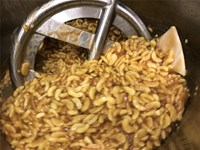
Why Mixing is So Vital to Organic Food Processing Operations
Organic food processors go to great lengths to ensure authenticity in their products. But if their end-product lacks the slices, chunks and homestyle texture expected of fresh and natural ingredients, then the extra effort and cost to comply with organic certification could go for naught. The reality is, if it doesn’t look organic, consumers may not buy it.

The Earlier the Better: When Food Manufacturers Should Bring Processing Equipment Engineers into New Product Development
Chances are, if you are in the food manufacturing industry, you think a lot about new product development. Many food manufacturers consider it to be the driving force of their organic growth. They make great investments to develop new products that attract consumer interest and widen their revenue streams. Yet, despite the emphasis, it is not uncommon for manufacturers to limit their potential by setting up shortsighted or sub-optimized production processes to produce their new products.

Challenge Accepted: Preventing Burn-On When Cooking Cheese Sauce in a Jacketed Kettle
As anyone who has melted cheese on a stovetop knows, it is nearly impossible to keep it from sticking to the pot. And cleaning the inside surface afterward can be difficult. This was the challenge faced recently by one of our contract process and packaging customers. See how we solved this challenge in our latest blog article:
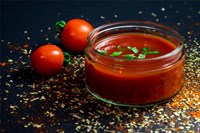
Sauce Manufacturing: Be Sure to Consider These When Choosing Your Processing Equipment
The sauce category within the food manufacturing industry is growing about 4.1% per year, spurring product innovation from both small and large processors. Processing vessel options can be as varied as the sauces themselves, with many design choices that will impact your product’s quality, consistency and production efficiency. To help you decide what’s best for your sauce processing operation, be sure to consider these factors:
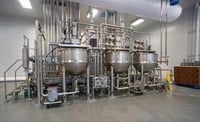
Which lasting effects of the COVID-19 crisis will food manufacturers factor into 2021 planning?
The food industry is near the top of any list of those most directly affected by the coronavirus pandemic. The entire food supply chain -- from farming and processing to distribution and consumption -- has been disrupted, in many cases dramatically. Food manufacturers are sorting through this confusion to ensure they are well-positioned to operate effectively and take advantage of new opportunities. As they look ahead to 2021, several expected long-term effects will factor into their planning. See what to expect in our latest blog article:

Processing Equipment Options for Food Manufacturers to Meet Crisis Demand
Demand for many packaged food products is skyrocketing. Manufacturers are doing everything they can to keep up as they ramp production, while also enforcing heightened disinfection and social distancing directives. For some manufacturers, ramping production will necessitate stocking replacement valves and parts for processing equipment to ensure continuous operation, or even adding processing kettles or tanks to increase throughput. Here is an overview of options in-demand food manufacturers can consider:

A Key Nugget Buried in New Research Identifies How Food Manufacturers Plan to Increase Production
Each year Food Processing magazine conducts research to identify industry trends. At Lee Industries, this is always interesting to us as it highlights the issues on the minds of many of our customers. This year, however, the insight was particularly interesting...

Challenge Accepted: Increasing Evaporation Rates to Accelerate Production
Some of our best work happens in the engineering room. A manufacturer of jams and jellies approached us with a unique challenge, requiring precise calculations to optimize their evaporation rates. See how we helped this client expand their heat transfer area and accelerate production.

Challenge Accepted: Faster Cooling in Jamaica
Sometimes, where you make a product will dictate how you make it. That was the case for a customer in Jamaica, a processor whose frozen food product contained ground meat. See how we helped this client meet the process time requirements in a very hot climate area.
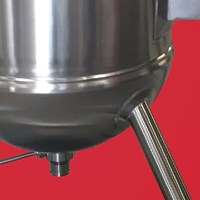
Food Industry Growth Forcing Manufacturers to Rethink Processing Equipment
We’ve been a part of the food manufacturing world for over nine decades, so we know that change is a constant for the industry. But the pace of change today – and its impact on the food manufacturing process – is more significant than ever. Here are some of the key implications we see that will affect how food manufacturers make decisions on their processing equipment:

Improving FSMA Compliance with Safety Features
Food safety is the top concern for food manufacturers this year, in no small part because of the FSMA. In Food Processing magazine’s annual industry survey, 27% of respondents identified food safety improvements as their top priority for this year. What components will these manufacturers scrutinize? Here are three areas where changes to manufacturing equipment can improve FSMA compliance.

Three Vessel Design Enhancements to Improve Your Throughput
Faster batch processing is a common goal for food processors. It’s often the impetus for adding more processing equipment. But improving throughput can involve much more than simply adding capacity. Depending on your objectives, optimizing your vessel design can dramatically reduce your batch processing time while also improving safety, product quality and product consistency. Here are three areas where optimizing your processing vessel can produce significant results.
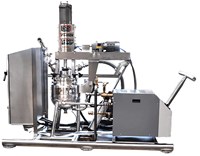
Steam or Hot Water? Which Heating Source is Best for Your Operation?
Choosing a heat source is a key consideration for all food processing operations. For processors who use a jacketed kettle design, the choice comes down to steam versus hot water. But is one of them superior? And when would you choose to use one heat source over the other? Let’s consider some of the advantages of both steam and hot water while taking a look at some potential applications.
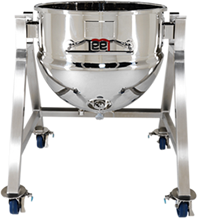
Two Ways Food Processing Kettles Prevent Waste — And Help the World
In food manufacturing, 32.4 percent of all food waste is tied to production issues, much of which could be prevented. However, food production kettles can be a big asset in the fight against food waste, both in their actual function and in the larger application of food safety guidelines in the production process. We've identified two key areas where kettles can make a difference.

Crucial Factors to Consider When Expanding Your Food Processing Operation
No matter the size of your current food processing operation, you may someday need to expand. If and when that day comes, you’ll have to address important questions regarding the expansion’s impact on your production.
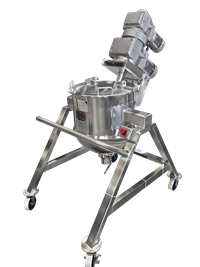
Three Ways Inclined Agitation Improves Operational Efficiency
Choosing the right kettle design is a key part of your food processing operation. When it comes to optimizing your production, there are two clear alternatives in the mixing and agitation area: horizontal ribbon blenders and hemispherical kettles with inclined agitation.
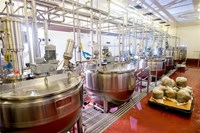
Five Questions to Ask When Buying a Used Kettle
Buying a used processing kettle can be a great option for expanding your operation or replacing older equipment. Used kettles and other vessels can often be available more quickly for lower prices than you’d see if you were buying new. But after weighing availability, price and basic design factors like shape, capacity and agitator type, there are other things you should weigh when deciding whether or not to buy a used kettle.

Use the 10X Rule to Guide Your Food Production Expansion
Your food product is taking off and you need to increase your production capacity to keep up. If that is your situation, you may be asking a fundamental question to determine your processing equipment needs: how much capacity can I get from each processing kettle without affecting my product’s quality or consistency?
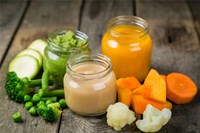
Lee Industries Explores Blending Options in Latest Production Guide
The latest production guide from Lee Industries explores the differences in the two predominant mixer styles in food production – inclined agitation kettles and horizontal ribbon blenders.
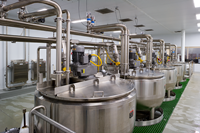
How to Improve Food Safety in Your Plant Operations
Assuring that your product will always be sanitary and free of contaminants is a critical food processing goal. So, when you are planning the design and configuration of your next kettle purchase, it is important to keep food safety in mind.
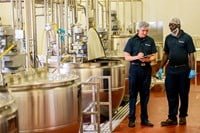
How to Improve Operator Safety in Your Food Processing Operations
During food processing, the safety of your production team is key. This article features key safety issues to consider in your food processing operation.